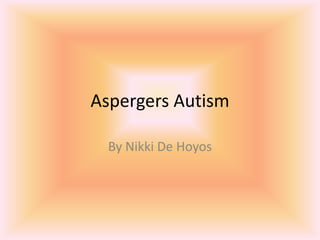
Aspergers Power Point
- 1. Aspergers Autism By Nikki De Hoyos
- 2. 1) In Aspergers, there is a dysfunction in which lobe(s) of the brain? A) Frontal B) Temporal C) Occipital D) A & B E) A & C
- 3. 2) Which of these is not a characteristic of Aspergers? A) High IQ B) Random fixations C) Hyperactivity D) Repetition in routines E) Inability to understand social construction
- 4. 3) Children with Aspergers are exceptionally more perceptive to outside stimulus than a regular child A) True B) False
- 5. 4) If a neurologist explained a social situation for someone with Aspergers, it would be something like this: A) Following a schedule B) Seeing a picture and drawing it C) Learning to play the piano
- 6. 5) One of the defining factors of Aspergers is the exceptional ability to understand deep verbal meaning and subtle body language A) True B) False
- 7. Aspergers Autism A developmental and neurological disorder There are studies shown that part of the disorder is a dysfunction in the frontal and temporal lobes of the brain. There is a possibility it is genetically linked. It is characterized by several things-
- 8. Fine-tuned senses Normally our brain can filter out stimulus People with Aspergerscan also do this but to a lesser extent They have high sensibility; Loud noises, bright colors, and sometimes even touching can be painful
- 9. Fixations/Routines To them, things are constantly going on, so they look for stability, often leading to fixations Imagine standing in the middle of the street with cars constantly going by you Surrounding them is chaos, this is why they like repetitive, easy to follow tasks and routines
- 10. Social/Emotional Odd Behavior & Inability to interact with peers To learn how to interact with peers was as if you or I were to learn how to play the piano It takes steps, motivation and careful evaluation They cannot empathize correctly with their peers It is hard to understand someone outside themselves
- 11. Peculiarities in Speech Elevated or odd speech, has varying tones/pitches Slow learning with language, inability to express oneself Take words literally, trouble understanding abstract terms such as figurative language Need concrete examples to match words to ideas
- 12. Inability to recognize non-verbal communication They do not understand body language, and do not recognize when someone is making an attempt to express non-verbally Ex: I am talking to you, you’re bored, sighing, holding your head in your hands, but I keep talking because I believe that as long as I’m interested, you are too
- 13. Intelligence/High IQ They more than likely have higher than normal IQ They’re often rejected for their weird lifestyle and different way of thinking by peers
- 14. 1) In Aspergers, there is a dysfunction in which lobe(s) of the brain? A) Frontal B) Temporal C) Occipital D) A & B E) A & C
- 15. 2) Which of these is not a characteristic of Aspergers? A) High IQ B) Random fixations C) Hyperactivity D) Repetition in routines E) Inability to understand social construction
- 16. 3) Children with Aspergers are exceptionally more perceptive to outside stimulus than a regular child A) True B) False
- 17. 4) If a neurologist explained a social situation for someone with Aspergers, it would be something like this: A) Following a schedule B) Seeing a picture and drawing it C) Learning to play the piano
- 18. 5) One of the defining factors of Aspergers is the exceptional ability to understand deep verbal meaning and subtle body language A) True B) False
- 19. Bibliography R. KaanOzbayrak, MD, . "Asperger's Disorder Homepage." 1/1/1996: Web. 1 Dec 2009. <http://www.aspergers.com/>. Martin L. Kutscher, MD, . "Autistic Spectrum Disorders: Sorting It Out." Asperger's Syndrome 2006: Web. 1 Dec 2009. <http://www.pediatricneurology.com/autism.htm#Asperger%E2%80%99s%20Syndrome>. Office of Communications and Public Liaison, . "National Institute of Neurological Disorders and Stroke." NINDS Autism Information Page. 10/19/2009. National Institutes of Health, Web. 1 Dec 2009. <http://www.ninds.nih.gov/disorders/autism/autism.htm>. U.S. National Library of Medicine, . "Asperger's Syndrome ." Medline Plus. 7/21/09. Department of Health & Human Services, Web. 1 Dec 2009. <http://www.nlm.nih.gov/medlineplus/aspergerssyndrome.html>.